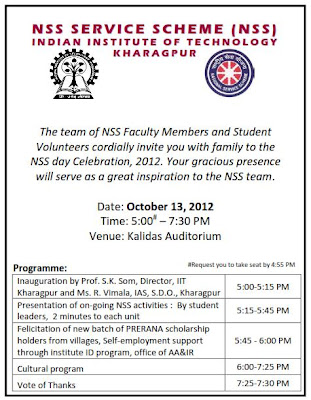Pariapara Village Project

[Four videos giving details from the field, are available at the end of this post.]
About one year back, proposals were asked by Sponsored Research & Industrial Consultancy (SRIC) Office of IIT Kharagpur to improve the condition of the people in our neighbourhood villages. For each project, maximum Rs. 1 Lakh of support was assured. Pariapara Unit of NSS, IIT Kharagpur took one project to improve economic condition of the villagers by demonstrating before them some alternative means of livelihood.
 The assessment of the village showed that water is a scarcity but farmers there did not know anything other than paddy cultivation which requires relatively large amount of water. Many a household there were found to have cattle. Two pronged strategies were thought. After lots of discussion and persuasion, some came forward to try something other than paddy. Technology input and other helps were provided to cultivate peanut and sweetcorn. There were more acceptance to try vermi-compost where organic manure from organic waste and cattle-dung were to be used. Nine household came forward for this to have vermi-compost pits in their houses. Again, technology input and special type of earth worms required for pits were provided to villagers.
The assessment of the village showed that water is a scarcity but farmers there did not know anything other than paddy cultivation which requires relatively large amount of water. Many a household there were found to have cattle. Two pronged strategies were thought. After lots of discussion and persuasion, some came forward to try something other than paddy. Technology input and other helps were provided to cultivate peanut and sweetcorn. There were more acceptance to try vermi-compost where organic manure from organic waste and cattle-dung were to be used. Nine household came forward for this to have vermi-compost pits in their houses. Again, technology input and special type of earth worms required for pits were provided to villagers. On 21st March, 2015 afternoon, the NSS unit organized an awareness drive of the villagers. By this time, the sweetcorn, peanut plants have grown reasonably and the villagers could see that it did not need as much water compared to adjacent paddy field. Also, for the vermi-compost pits, three-four harvesting (each takes 45-50 days) have been done for quite a few and they could see the final product and that it is odourless even if was produced from waste products.
On 21st March, 2015 afternoon, the NSS unit organized an awareness drive of the villagers. By this time, the sweetcorn, peanut plants have grown reasonably and the villagers could see that it did not need as much water compared to adjacent paddy field. Also, for the vermi-compost pits, three-four harvesting (each takes 45-50 days) have been done for quite a few and they could see the final product and that it is odourless even if was produced from waste products. In the afternoon awareness meet, first we went to the field where these crops were grown. Prof. Dilip Kumar Swain, Program Officer of the NSS Unit and the lead person of the project explained how the project started, the progressive farmer Sri Bapi Paria who took the courage to try something new also spoke, then NSS student volunteers shared their experience from their weekly visits and finally Prof. Debasis Roy, NSS Program Coordinator spoke this and other related activities; also made aware of Unnat Bharat Abhiyan initiatives.
In the afternoon awareness meet, first we went to the field where these crops were grown. Prof. Dilip Kumar Swain, Program Officer of the NSS Unit and the lead person of the project explained how the project started, the progressive farmer Sri Bapi Paria who took the courage to try something new also spoke, then NSS student volunteers shared their experience from their weekly visits and finally Prof. Debasis Roy, NSS Program Coordinator spoke this and other related activities; also made aware of Unnat Bharat Abhiyan initiatives. From the field, we went to Pariapara Village Primary School. The assembly there was addressed by Prof. Swain, Prof. Roy and one of the student leaders. Topics included were, better use of ground water, cultivating alternative crops that require less water, vermi-compost harvesting, children's education. It was followed by interactive session where it was planned that an initiative is to be taken on demonstrating water conservation. Three villagers at the end of the meeting came forward to try these newer technologies, specially the vermi-compost. For alternative crops, we expect that once they see the yield and return on peanut and sweetcorn, there will be more interest from village farmers.
From the field, we went to Pariapara Village Primary School. The assembly there was addressed by Prof. Swain, Prof. Roy and one of the student leaders. Topics included were, better use of ground water, cultivating alternative crops that require less water, vermi-compost harvesting, children's education. It was followed by interactive session where it was planned that an initiative is to be taken on demonstrating water conservation. Three villagers at the end of the meeting came forward to try these newer technologies, specially the vermi-compost. For alternative crops, we expect that once they see the yield and return on peanut and sweetcorn, there will be more interest from village farmers. Finally, the village kids who are very fond of our NSS student volunteers from their weekly visits and help provided for study, posed together with NSS team for a group photograph.
Finally, the village kids who are very fond of our NSS student volunteers from their weekly visits and help provided for study, posed together with NSS team for a group photograph.All the videos of this awareness meet is available in this playlist (Link) and the same is also made available below with some other photographs of the afternoon.
Video of work done in this project:
Video of work description from the field:
Video of developing awareness among villagers from work done:
Video of interactive session with the villagers:











Comments